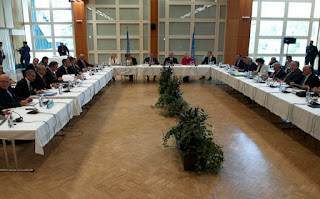Time for Closure in Cyprus: Keeping the Faith

With the start of the new round of talks in Crans Montana on 28 June regarding the future of Cyprus, all the bets are on as to whether these will lead to a deal or be another part in a long process of reconciliation but not enough to cross the finish line. Although the momentum that was evident at the beginning of the year has significantly stalled, the United Nations through its good offices has managed to get the leaders of the Greek and Turkish Cypriot communities, the representatives of the three guarantor powers – Greece, Turkey, and the United Kingdom, and the representative of the interested party – the European Union, to return to the negotiating table. The stakes are a historic deal in the making and the implications of a non-deal should the talks fail to yield positive results with the chances evenly divided for either outcome to prevail. The optimistic scenario stems from the fact that the leaders of the two communities – Nicos Anastasiades and Mustafa Aki...